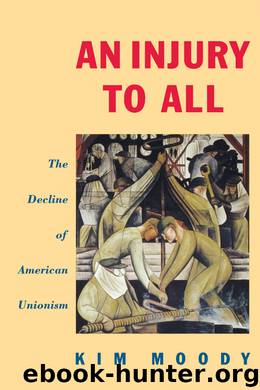An Injury to All by Kim Moody

Author:Kim Moody
Language: eng
Format: epub
Publisher: Verso Books
Do Concessions Save Jobs?
The entire rationale for making concessions has been that they will, in one way or another, save jobs. This rationale has advanced from an argument for a temporary or exceptional modification of bargaining practices and contracts to a basic component of business unionist ideology for many union officials – committed as they are to shifting the union to a nonadversarial relationship with industry. However, few have put it as bluntly as UAW Vice President Don Ephlin, who announced that the role of the union in this era is to ‘reverse the rapid decline of America’s manufacturing industries and help restore US competitiveness where it counts, in the battle for markets and jobs.’44 In this view, concessions, like protectionism or labor-management cooperation, are just one means to that end.
Top union leaders do not mean by such statements that they plan to save all existing jobs. Since they share the company’s concern about being competitive, they accept that rationalizations, new technology and other labor-saving steps will be needed. Nevertheless, when selling a contract to the members who are worried sick about losing their jobs, this more businesslike view of saving some jobs by allowing the company to cut labor costs is seldom mentioned. The concessions, they argue, will save jobs. But do they?
By the mid-1980s the record indicated that the answer is no, concessions do not save jobs or plants. A study of twenty-two tire plants that made concessions between 1977 and 1981 showed that all but five of them closed anyway.45 In 1983, the same year that it received concessions from the USW, US Steel announced plans to close one-third of its remaining steel capacity as well as various finishing and fabricating mills.46 Chrysler, of course, closed several plants as part of the bailout operation and continued closing plants after returning to profitability.47 In March 1987 Chrysler announced that it would buy AMC from Renault for $1 billion; in that same week, it also announced that it would close a parts plant in Indiana.48
In 1986 the UFCW published a list of twenty-five plants that had been closed in whole or in part after concessions had been granted and concluded that ‘the evidence is overwhelming that concessions do not prevent the closing of meatpacking plants.’49 In November 1986 General Motors announced the closing of nine plants and sections of two others. In February 1987 GM amended this by announcing a $10 billion cost-cutting effort. This would include the ‘review’ of additional older assembly plants. GM also stated that it would reduce the proportion of components produced in-house (now 70%) by using outsourcing – a move that one industry analyst speculated could mean the closing or sale of as many as twenty components plants in the near future.50
Seven years of concessionary bargaining did not save jobs at the industry level either. As Table 6 shows, the level of employment at the end of 1986 had not returned to the prerecession levels of 1978 in any of the major manufacturing industries in which concessions were widespread, except for aircraft and trucking.
Download
This site does not store any files on its server. We only index and link to content provided by other sites. Please contact the content providers to delete copyright contents if any and email us, we'll remove relevant links or contents immediately.
